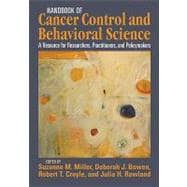
Note: Supplemental materials are not guaranteed with Rental or Used book purchases.
Purchase Benefits
What is included with this book?
| Contributors | p. xiii |
| Foreword | p. xvii |
| Preface | p. xxi |
| Introduction to Behavioral Science and Cancer | p. 1 |
| Overview, Current Status, and Future Directions | p. 5 |
| Trends in Modifiable Risk Factors for Cancer and the Potential for Cancer Prevention | p. 23 |
| Creation of a Framework for Public Health Intervention Design | p. 43 |
| Methodology in Cancer Prevention and Control | p. 57 |
| Designing and Evaluating Individual-Level Interventions for Cancer Prevention and Control | p. 61 |
| Design and Analysis of Group-Randomized Trials in Cancer Prevention and Control | p. 85 |
| Participation in Cancer Clinical Trials | p. 103 |
| Quality-of-Life Assessment in Cancer | p. 115 |
| Primary Prevention: Reducing Cancer Incidence | p. 129 |
| Understanding and Communicating About Cancer Risk | p. 133 |
| Prevention of Tobacco Use | p. 151 |
| Interventions for Smoking Cessation | p. 167 |
| Interventions to Modify Dietary Behaviors for Cancer Prevention and Control | p. 189 |
| Interventions to Modify Skin Cancer-Related Behaviors | p. 209 |
| Behavioral Science Applications to Gynecologic Cancer Prevention | p. 225 |
| Interventions to Modify Physical Activity | p. 237 |
| Secondary Prevention: Early Detection of Cancer | p. 251 |
| Behavioral Research in Cancer Screening | p. 255 |
| Psychological Consequences of Cancer Screening | p. 279 |
| Psychological Issues in Genetic Testing | p. 303 |
| Tertiary Prevention: Treating Clinical Cancer | p. 323 |
| Practitioner-Patient Communication in Cancer Diagnosis and Treatment | p. 327 |
| Behavioral Interventions for Side Effects Related to Cancer and Cancer Treatments | p. 347 |
| Psychosocial Response to Cancer Diagnosis and Treatment | p. 361 |
| Reduction of Psychosexual Dysfunction in Cancer Patients | p. 379 |
| Family Care During Cancer Care | p. 391 |
| Quaternary Prevention: Cancer Survivorship | p. 409 |
| The Experience of Survival for Patients: Psychosocial Adjustment | p. 413 |
| Physical Late Effects of Cancer: Implications for Care | p. 431 |
| Psychosocial and Behavioral Issues in Cancer Survival in Pediatric Populations | p. 449 |
| Long-Term Effects of Cancer on Families of Adult Cancer Survivors | p. 467 |
| Health Promotion and Disease Prevention in Adult Cancer Survivors | p. 487 |
| Future Directions in Behavioral Science and Cancer | p. 495 |
| Brain, Behavior, and Immunity in Cancer | p. 499 |
| Translation of Research Into Public Health Practice | p. 517 |
| Transdisciplinary Social and Behavioral Research for Cancer Prevention | p. 531 |
| Interactive Health Communications for Cancer Prevention and Control | p. 547 |
| Author Index | p. 559 |
| Subject Index | p. 621 |
| About the Editors | p. 651 |
| Table of Contents provided by Ingram. All Rights Reserved. |
The New copy of this book will include any supplemental materials advertised. Please check the title of the book to determine if it should include any access cards, study guides, lab manuals, CDs, etc.
The Used, Rental and eBook copies of this book are not guaranteed to include any supplemental materials. Typically, only the book itself is included. This is true even if the title states it includes any access cards, study guides, lab manuals, CDs, etc.